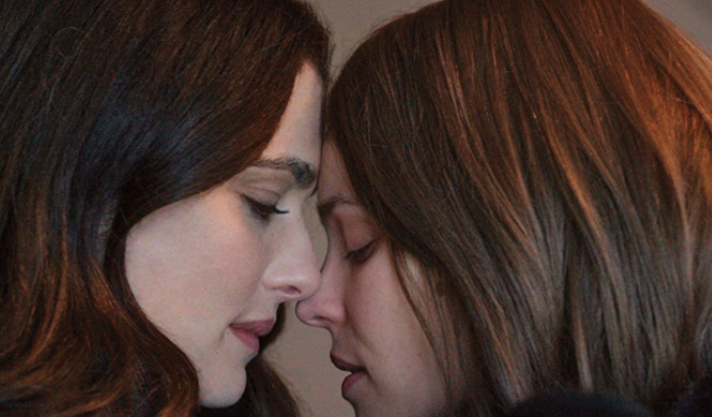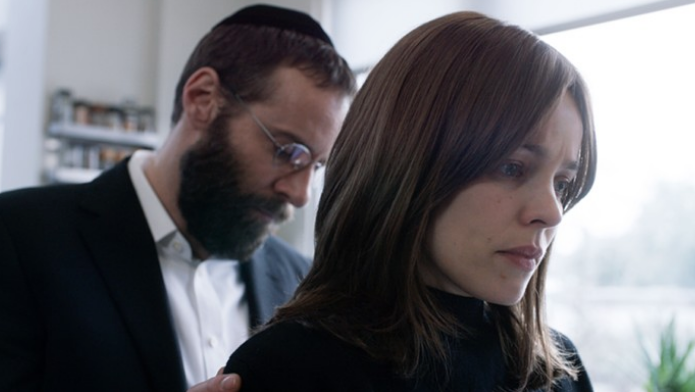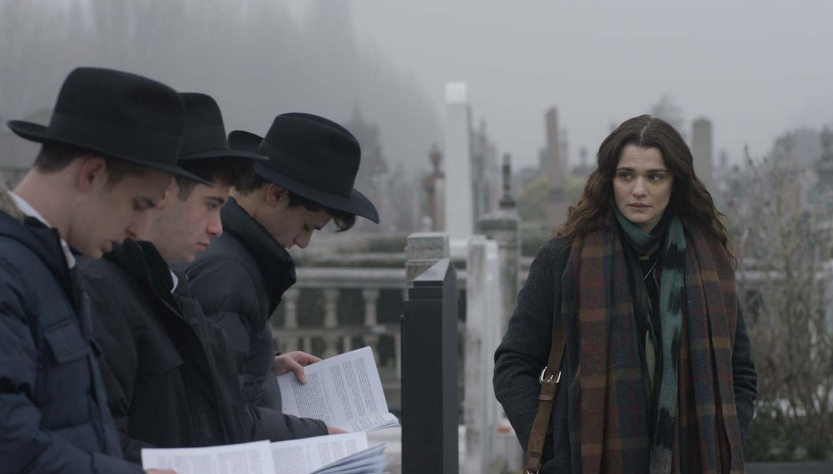Cinematic gay romances have faced obstacles even in the best and most tolerant of circumstances (say, Call Me By Your Name). When they take place within a community that not only forbids them, but strictly defines gender roles in ways involving age-old customs, then they assume an additional air of the forbidden. And any romance attempting to flourish under impossible circumstances has an immediacy for us viewers that your everyday romances do not.
Those are the particular circumstances of Disobedience, Sebastian Lelio’s follow-up to A Fantastic Woman, which has only just recently left Australian cinemas. It’s also the English language debut for the Chilean director, and it finds him unafraid to take on another element presumably outside his comfort zone: the inner sanctum of the orthodox Jewish community in the UK. The fact that he does great things with it suggests that 2018 could be a true breakout year for the director, and he could be giving us first-rate films for years to come.
The story concerns a British photographer, Ronit (Rachel Weisz), who is living in America when she learns that her father back home, a rabbi and leading figure in the community, has died. Her current country of residence functions as a symbol for the ways Ronit has cast herself out of the insular community into which she was born and from which she was never supposed to stray. Children born into the traditional ways of orthodox Judaism are meant to accept it and live their lives according to its practices, but Ronit didn’t believe in that kind of predestination so she left. Which makes her persona non grata upon her return, even when she’s there as a mourner, presumably worthy of sympathy.
Her two best friends from childhood, Dovit (Alessandro Nivola) and Esti (Rachel McAdams), are welcoming to a point, but they’ve signed on to what the community requires of them, both in terms of their own life choices and the pressures to give the prodigal daughter the cold shoulder. Ronit is equally surprised to see what has become of them, as the dynamics have shifted considerably from when the three of them were a trio of platonic friends back in the day. Now the other two have married each other without Ronit even being aware of that, and begun living the lives expected of them, including Dovit’s rapid ascension in the pedagogy of the faith.
Lelio’s depiction of this community is reflected in the sparse colour palette he chooses. Orthodox Judaism is a strain of the faith that entails muted colours to begin with, particularly in the wardrobes, but Lelio takes that one step further with the colour, or lack of colour, in the sets and elsewhere. Among the actors, McAdams is the embodiment of this. Her complexion is sallow to the point of almost appearing grey. The demands of this life, and the way they force her to deny her actual sexuality and any hope of real happiness, have literally turned her grey.
So perhaps this is what makes the passion between the two Rachels – Ronit and Esti by their character names – so hot. I don’t mean “hot” in a cheap, prurient way, though their intimate scenes can be titillating. They’re hot in contrast to the coldness of this existence, which stipulates which nights of the week a husband and wife have sex, what outfits they are permitted to be seen in, and whether the women can actually display their own hair publicly (many orthodox women, including Esti, wear what’s called a “sheitel,” a wig that covers their natural hair). Given the strictures of this life, their pursuit of the desires of their body and heart feels extra rebellious.
And yet Lelio is not here to paint a portrait of orthodox Jews as unsympathetic villains. Taken individually, even the most devout practitioners of their faith can show kindness and an understanding that it’s 2018 and that the world cannot always conform to their specific ways.
Their treatment of Ronit is emblematic of this tension. Their instinct as orthodox Jews is to shun her, as she committed the cardinal sin of rejecting the thing they hold so dear (and it’s hard to be certain what percentage of them knew about her lesbianism; some certainly did). Their instinct as humans, however, is to reach out and comfort a person they knew when she was only a child, a beloved offspring of a dear man they just lost. While a lesser film would have had them double down on their dogma, Disobedience understands that the shades of grey are not only in their clothes.
No character may exemplify this more than Nivola’s Dovit. He was a direct disciple of the teachings of the deceased rabbi, and pegged as his heir apparent. Yet this is also a man who, as a teenager, called himself a close confidant of these two women who were obviously not cut out for this way of life. Both people are present inside this one character, and Nivola expresses this through the awkward half gestures of first seeing Ronit, when he wants to reach out and hug her even though his faith prohibits him from doing so. As much as Disobedience is about the struggle of these two women to reconcile their reality with their desires, it’s also the story of Dovit’s spiritual struggle.
Disobedience starts out addressing the idea of choice, as the final words of the rabbi are in temple, moments before he dies, when he describes it as the thing that separates humans from the beasts on one side and the angels on the other. While those two extremes obey a sense of duty to goodness and a sense of duty to their basest instincts, it’s humans who are free to disobey. This may feel like a rather pointed foregrounding of the film’s title and themes, but it sets up the whole arc of what becomes a profound story about duty and desire. Disobedience provokes thought consistently.


